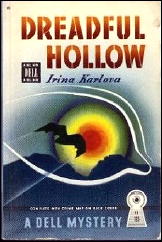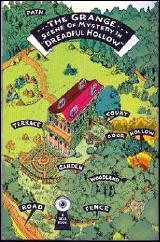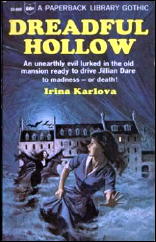Sun 12 Dec 2010
Reviewed by J. F. Norris: IRINA KARLOVA – Dreadful Hollow.
Posted by Steve under Authors , Bibliographies, Lists & Checklists , Reviews[11] Comments
IRINA KARLOVA – Dreadful Hollow. Hurst & Blackett, UK, hardcover, 1942. Vanguard Press, US, hardcover, 1942. Reprint paperbacks include: Dell #125, 1946; Paperback Library 53-860, 1965; 2nd pr., 64-030, 1968.
This gothic supernatural novel with detective novel elements wavers between genuinely creepy and outrageous self-parody. At the time I was reading it I wondered if Karlova is a pseudonym for some better known writer. The name seems influenced by Universal horror movie characters and actors. I later learned that I was correct.

The author’s real name is Helen Mary Clamp (sometimes noted as H.M. Clamp), and she was extremely prolific throughout her lifetime. In addition to writing three supernatural novels using the Karlova pen name, she wrote over 60 novels from main stream to romance to adventure under her given name.
Using yet another pseudonym (Olivia Leigh) she wrote a few more romances and eleven literary biographies on historical figures such as Nell Gwynn, Charles II of Spain and Louis XV. Her writing career lasted from 1925 to 1970.
Dreadful Hollow seems to be influenced by those Universal monster movies I mentioned earlier. It certainly seems to be a bit of a coincidence that those films with all the Eastern European atmosphere and characters should share such a similarity with this book written several years after those films were popular.
It is peopled with Hungarian gypsies, a mysterious countess of either Czech or Hungarian descent, and a stuffed werewolf, and the dread vampire legend looms large over the story.

Although it does borrow a framework from the detective novel in that the two narrators do some digging up of clues and interview servants and neighbors, it really is nothing more than a pulpy, over-the-top horror novel with all the usual HIBK trappings of the neo-Gothic novel.
The major difference is that whereas most of those books are pale imitations of a Gothic novel, Karlova’s book is indeed a true Gothic. She does very well with all the Radcliffian elements – emphasis on dreary landscapes and decaying households, a real femme fatale, a ninny of a heroine who suspects she is losing her mind, and genuine supernatural beings and activity.
As I read I also noted that the structure of the novel was probably inspired by Stoker’s Dracula, with the first person narrative journal entries of young Dr. Clyde (who seems to have escaped from the pages of a pulp magazine like Speed Detective — he speaks in an entirely American wiseacre slang) interspersed with the third person limited sections focusing on Jillian Dare, the young girl hired to act as a companion to an ancient crone.
The book is unintentionally funny and the mystery is, sadly, to a modern reader, rather obvious from the opening chapters. When young Countess Vera arrives on the scene, any reader who hasn’t instantly figured out the mystery has probably never seen a vampire movie in his or her lifetime.

That isn’t to say the book is not without its deliciously gruesome surprises. There is a disappearance of a young boy that isn’t fully explained until the final pages, for instance. I have to confess that I was alternately raising my eyebrows, gasping and laughing in the final pages which really do get rather wild and bizarre for a book of this era.
I am sure that even most jaded contemporary reader will find something thrilling in Dreadful Hollow. They certainly don’t write them like this anymore.
A side note: Some additional research turned up several articles on the internet which mention the fairly recent discovery of William Faulkner’s screen adaptation of Dreadful Hollow.
Apparently the find happened sometime in 2001 by his daughter who turned the script over to Lee Caplin, Faulkner’s literary executor. Caplin also happens to be a film producer and was toying with the idea of making the movie. Here’s a link to the news story I found from 2007.
And there is also some mention of the discovery of the script in a article back in the March 2009 issue of The Faulkner Journal: “The Unsleeping Cabal: Faulkner’s fevered vampires and the other South.”
But now in 2010 it seems the whole thing as been scrapped. There is no info on the movie on Lee Caplin’s website for his Picture Entertainment outfit and nothing noted on his page at IMDB — a source I find generally reliable about films in pre- and post-production.
Irina Karlova’s supernatural mysteries:
Dreadful Hollow. Hurst & Blackett, 1942.
The Empty House. Hurst & Blackett, 1944.
Broomstick. Hurst & Blackett, 1946.
December 12th, 2010 at 10:09 pm
John, I just bought this book a few weeks ago! The combination you describe was irresistible.
I have to say the name change was quite wise. H.M. Clamp isn’t nearly as appealing a name for a writer of a vampire novel (maybe for a Popular Mechanics article?).
December 14th, 2010 at 10:34 am
I have a copy of BROOMSTICK buried in one of my many “To Be Read” piles. When I get through it I’ll be sure to write up a review. Interestingly, on the DJ of that book there is an ad that mentions “Author of THE EMPTY HOUSE” and that it went into multiple printings. I have been searching for THE EMPTY HOUSE for decades. Where did all those copies go? Not one copy has turned up for sale on-line or in any of the catalogs I receive in the mail in all that time. The hunt continues…
December 14th, 2010 at 2:08 pm
The author’s full name was Helen Mary Elizabeth Clamp and her books were published as by H.M.E. Clamp. She was born 1892 in Woking, Surrey and died in 1973 in Hove, Sussex. Although I have had a few books she wrote under her own name and as Olivia Leigh I have never seen the UK editions of the books she wrote as Irina Karlova
December 14th, 2010 at 2:40 pm
H.M.E. Clamp sounds like it should be the name of a battleship.
Look forward to John writing a Broomstick (review).
December 14th, 2010 at 2:51 pm
Were there American editions of the later two books? Some British publishers simply lied about the number of copies of books sold, by the way!
December 14th, 2010 at 3:11 pm
DREADFUL HOLLOW is the only one of Karlova’s books to have a US edition. The Dell mapback was quite common a few years back, but maybe not so any more.
Mapbacks, by the way, were very collectible for a long time, but as with most older “vintage” paperbacks, I think the interest in them has died down drastically. Unless they’re over 60, I doubt that most of today’s mystery readers even know what they are. (But the two images I added to this review should be of assistance if you don’t.)
December 14th, 2010 at 4:09 pm
Hey, I’m 44 and I love those things! Of course 44 ain’t exactly blushing youth. But I started reading John Dickson Carr in 1989, I believe, in those IPL editions that were homages to the old mapbacks. I didn’t know that at the time but I loved those IPL editions with their houseplans on the back. The first one I got was The Judas Window.
December 15th, 2010 at 11:01 am
Steve –
You’re right most people have no idea about Mapbacks. At the Chicago Bouchercon back in 2006 when I was selling a cartonful of them at my table I ended up doing mini-lectures on the evolution of the Mapback. I was surprised how many people had never seen one! It’s defintely one of those arcane bits of knowledge reserved for mystery novel collectors and booksellers.
My first vintage book was the Mapback edition of THE SKELETON IN THE CLOCK. I first learned about them in an article in MURDER INK – a birthday present I received when I was in high school (I’m just a few years older than you, Curt). I now have close to 100 Mapbacks! I love those books, too – especially the early ones with the airbrushed artwork. Some of those covers are amazing examples of surreal art.
And how dare those publishers lie about their sales! Boo, hiss.
December 15th, 2010 at 2:15 pm
Yeah, it wouldn’t surprise me if the multiple printings claim was a fib to impress people. When I see a British mystery with the claim thousands sold! I’m pretty dubious (unless it’s Edgar Wallace or someone of that sort).
Mapbacks are great. I also love the paperbacks with the “what this books is about” page:
What this book is about: a disappearing will, a a girl who screamed in terror in the night, a smashed compact, a jade toad, a man at the window, a clock that ran backwards, a bronze scythian knife, a dead voice from the past, a pool of blood where there was no body to be found….
I mean, how could you not want to read the book after all that?
January 11th, 2020 at 5:57 pm
Mary Clamp (as she was known in the family) was our Grandpa’s cousin! Thank you for the additional information some of you have posted here. We didn’t know about the film idea or some of the other information that has been posted on here. My Mum remembers meeting her in the 1950s. Apparently she was quite a tall, fairly well built lady in her recollection and loved to talk!
January 11th, 2020 at 7:36 pm
Hi Lucy
Thanks for stopping by. It’s always wonderful to hear from people related to some of the authors we write about here. I’ll make sure that John gets to see the comment you left.